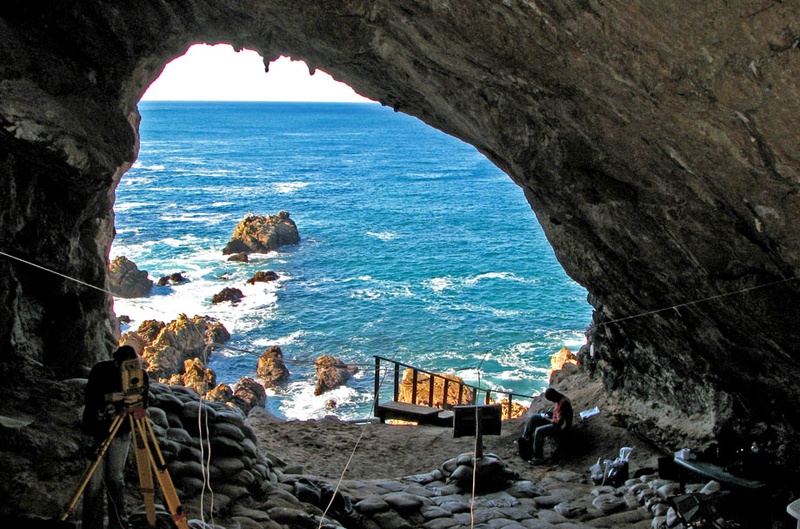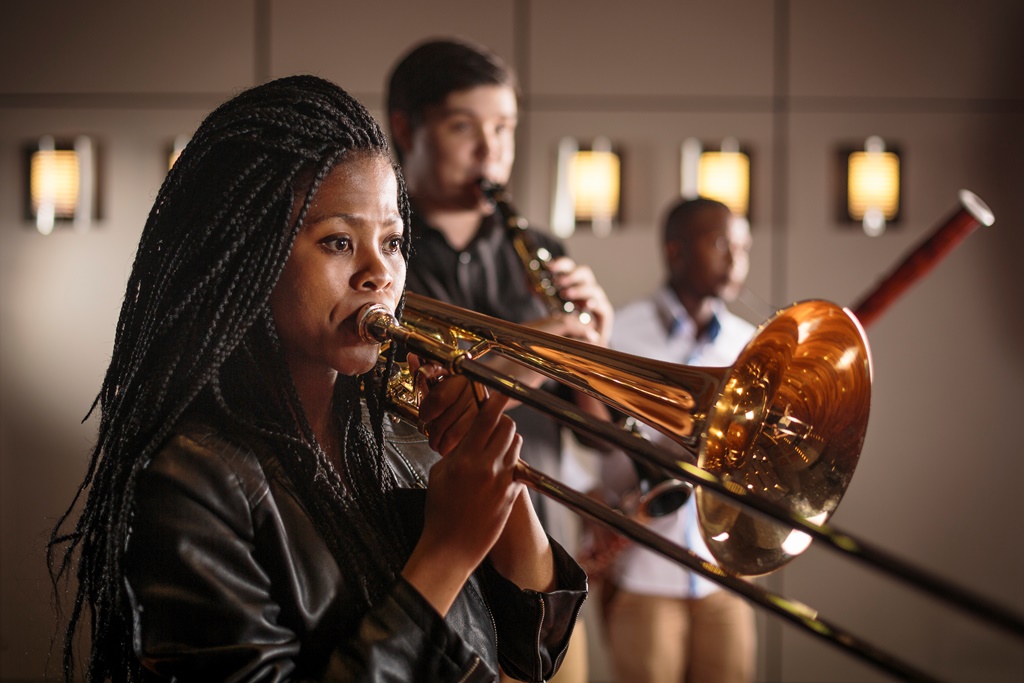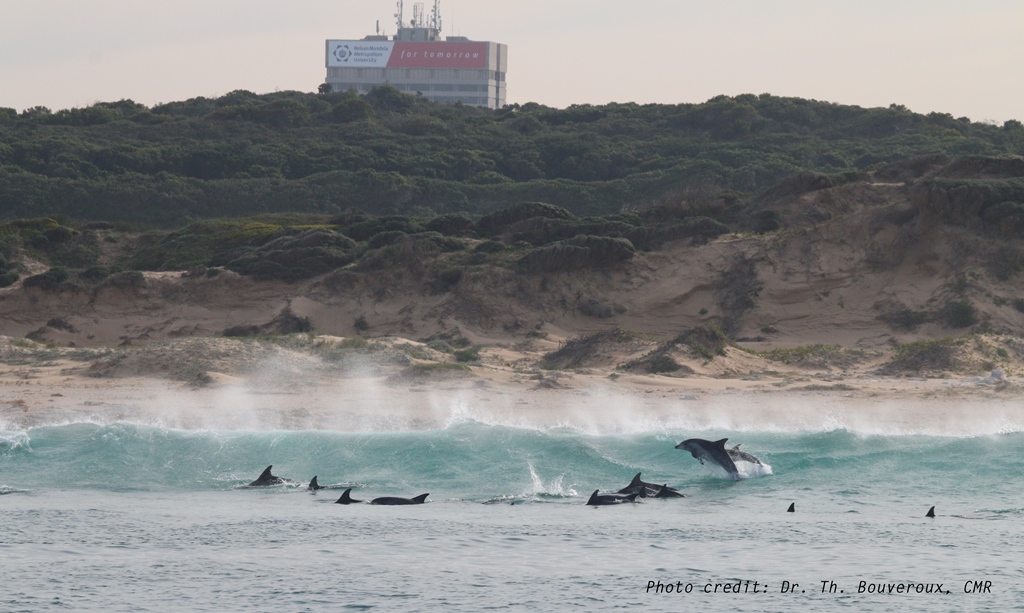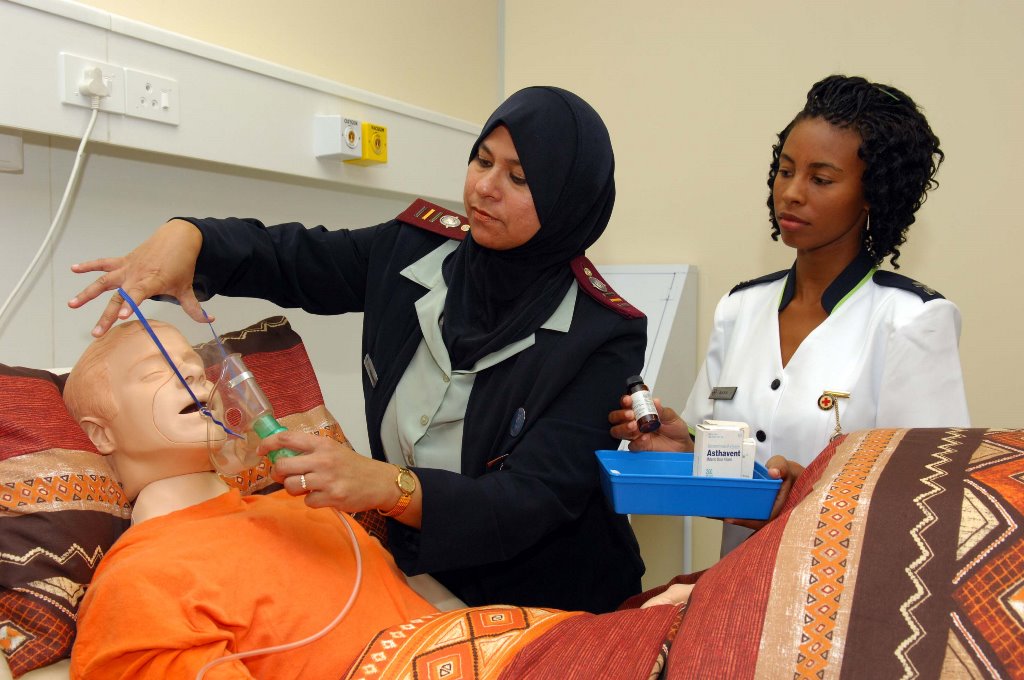Four pivotal new developments
Four of the pivotal new developments that will lead Nelson Mandela University into the future are the establishment of the Ocean Sciences Campus, Interprofessional Education & the New Medical School, the Centre for Coastal Palaeosciences and the Bird Street Campus and Art Gallery.
Centre for Coastal Palaeoscience
Research along South Africa’s Southern Cape coast has produced more evidence of the development of complex cognition in humans than anywhere in the world. This region, which includes two biodiversity hotspots, is home to the earliest evidence of the emergence of modern humans who displayed a distinctly coastal adaptation.
This new Centre is collaborating with Arizona State University and others to research the palaeontology, palaeoclimate and palaeoenvironmental sciences and geosciences of this area, which is regarded as one of the most important evolutionary theatres globally. Understanding the dense natural resources that sustained humans along this coastline, notably fish and shellfish, bulbs and other vegetation that sustained people could produce insights and outcomes that are unique in the world.

Bird Street Campus
Nelson Mandela University’s School of Music, Art and Design has spearheaded a range of projects that connect the University to the community, including Route 67 - a walk through the artistic and culturally rich district of Central in the city. It is called Route 67 in symbolic deference to Nelson Mandela’s 67 years of dedication to the freedom of South Africa.
To create the Bird Street Campus in Central, the University bought and restored the historic buildings on the Bird Street Campus for postgraduate studies in Music, Art and Design and public exhibitions. It has a music centre where lecturers and postgraduate students teach pre-tertiary learners who cannot read music to acquire this skill ahead of university.
They also teach primary and secondary learners a range of voice and music skills, including jazz, the violin and piano. The School has a strong relationship with the Eastern Cape Philharmonic Orchestra and its exceptional community choir. The restored Bird Street space has a beautiful public art gallery and large community area for public concerts.

Ocean Sciences Campus
Our new, flagship trans-disciplinary Ocean Sciences Campus, the first in South Africa, will be launched in 2017. Our strategy is to develop a whole new range of maritime and marine education, training, research, innovation and engagement programmes to support Africa’s blue economy.
This will position Nelson Mandela University as the leading marine and maritime university on the continent, with extensive local and international partnerships contributing to this innovative new campus and blue economy driver.
The Ocean Sciences Campus is part of our University’s strategic partnership drive between the university, industry, business and government to develop and implement co-designed education, training, research, innovation and engagement initiatives that are geared to unlock the potential of South Africa’s oceans economy.
A force for good and release from poverty
Mandela held education as a force for good, as the cornerstone of freedom and equality that could release people from poverty.
We will leverage the potential of the oceans economy to sustainably address the challenges of poverty, unemployment and inequality. The ocean covers 70% of the earth’s surface and is an important source of food, energy and minerals.
We will focus on expanding our academic offerings in fields such as maritime economics and logistics, marine tourism, marine engineering, port development and management, marine spatial planning and the law of the sea, including fisheries law enforcement.
Our new Institute for Coastal and Marine Research has several Master’s and Doctoral candidates enrolled and is currently working towards the development of inter- and multi-disciplinary marine sciences programmes.
At faculty level, the Faculty of Science has healthy enrolments in Oceanography at Master’s and Doctoral levels, with discussions also underway to develop a joint multi-disciplinary Master’s programme in Marine Spatial Planning, in collaboration with Agder University in Norway.
In the Faculty of Law, the Centre for Law in Action (CLA) has registered five Short Learning Programmes (SLPs) relating to Marine Law and Fisheries Crimes. With funding from Norway it has established the International Training Academy for Fisheries Law Enforcement (called FISHFORCE) to train fisheries inspectors and other roleplayers in the criminal justice system. The Academy will focus on training at various levels, aimed at a reduction of fisheries crime and the impact thereof on marine resources and coastal communities.
The Department of Development Studies, in the Faculty of Business and Economic Sciences, has healthy enrolments in the new Master’s module on Maritime Business Studies, while the Departments of Tourism and Logistics are in the process of commissioning feasibility studies on the maritime programmes and specialist courses they have planned for 2018.
In the Faculty of Engineering, the Built Environment and Information Technology (EBEIT), the Bachelor’s programme in Marine Engineering has been developed and accredited, while the Bachelor’s in Nautical Sciences is currently being developed. EBEIT is also exploring a suitable academic platform for the construction of small vessels as well as specialised vessels, in alignment with the Operation Phakisa oceans economy objectives. A Finnish Professor of Practice from the Aalto University will be appointed (as part of an MOU agreement) to assist EBEIT in building capacity in navigation, naval design and naval architecture.
The Department of Environmental Affairs (Oceans and Coasts Division) has awarded Nelson Mandela University funding to establish a National Water Pollution Laboratory, which will assist in providing capacity to conduct ocean water studies. The Lab is intended to serve the whole of South Africa with regards to the testing, analysis and research of marine water. The National Water Pollution Laboratory will formally be housed within InnoVenton (Institute for Chemical Technology), which already has expertise in analytical water testing in its accredited laboratories.
At the beginning of 2016, the recipients of the following SARChI Chairs commenced employment at Nelson Mandela University: Professor Mandy Lombard, SARChI Chair of Marine Spatial Planning and Professor Mike Roberts, SARChI Chair of Ocean Science and Marine Food Security.
Both Chairs will contribute further to positioning Nelson Mandela University as the national leading university in these marine-related fields of expertise. The Ocean Science and Marine Food Security Chair is a Joint Chair with Southampton University and the National Oceanographic Centre (NOC) based in Southampton. As a result of the joint Chair with Southampton, we were also successful in being awarded a three-year grant for the exchange of research staff and doctoral students between Southampton and Nelson Mandela University. This will contribute significantly to the extent and depth of our research activities in the marine and oceanographic sciences.

Interprofessional Education & New Medical School
Nelson Mandela University’s new Interprofessional Education (IPE) programme, launched in March 2017, brings together 3500 students and lecturers from all ten disciplines in the Faculty of Health Sciences. As part of the programme they work with a range of under-resourced communities in the greater Port Elizabeth and Uitenhage area to holistically improve primary health care and wellbeing.
IPE takes an assets-based approach, where the students learn from each other and from the community members, which gives them a far greater understanding of the dynamics, health and environmental issues in each community.
“The assets-based approach moves away from a relationship of dependency; instead we work with the community to identify their strengths and health needs and what we can do together to address these.” – Nelson Mandela University’s advanced primary healthcare professional nurse, Sister Shanene Olivera, who manages the University’s mobile health education unit, Zanempilo.
More doctors for South Africa
“Our new medical school, which will help to serve the national health imperative of rolling out national health insurance for all South Africans,” - Executive Dean of Health Sciences, Professor Lungile Pepeta.
In 2016 our University was given the go ahead to start establishing a new medical school to serve the Eastern Cape and South Africa. Our goal is to be able to offer a full undergraduate medical degree (MBChB) by 2020 and further evolve to include medical specialist training by 2025.
The context of the new medical school is that the current training output of medical schools across South Africa is between 1200 and 1300 doctors per year, which is hopelessly too few. The role-out of National Insurance for all means the Department of Health alone requires at least double this number.
The latest figures for South Africa show that the country has 9 doctors per 10 000 people compared to a country like Brazil, which has twice as many at 19 per 10 000. To make matters worse, 75 % of all our doctors are in the private sector in South Africa i.e. about 14 doctors per 10 000 people, which means that only 25% of doctors are in the public sector, which puts the figure at about 3.7 doctors per 10 000.
Mandela’s humanistic values, egalitarian principles, courage, internationalisation and his emphasis on the importance of education and innovation, and quality of life for all people: these are the themes of Nelson Mandela University.
We are fortunate to have a strong base from which to establish our new medical school, using a building block approach that augments our Faculty of Health Sciences’ current offerings. These include a diversity of professions: Psychology, Social work, Environmental Health, Biomedical Technology, Sports Sciences and Biokinetics, Pharmacy, Radiography, Nursing Sciences, Dietetics and Emergency Medical Care.
Our student numbers in health sciences have been steadily growing, from approximately 2800 in 2012 to 3600 in 2016. The medical school offering will exponentially increase this.
The building block or ‘bottom up’ approach we are pursuing in establishing a new Medical School is a more affordable model, which incrementally adds medical undergraduate programmes onto an existing faculty of health sciences and upgrades existing infrastructure belonging to the university and its broader clinical training platform (hospitals and clinics), with the assistance of the National Departments of Higher Education and Eastern Cape Health.
This approach contrasts with the ‘top down’ model of securing vast amounts up-front for new buildings, infrastructure and human resources, exclusively for a medical school
Based on our building block approach, in 2020 we will accept our first group of first year students, as well as a group of graduates into third year – these graduates will be from the new Bachelor of Public Health degree as well as from other Health Sciences programmes who qualify for entry into the third year level of our Graduate Entry Medical Programme (GEMP).
South Africa needs to approach best practice in Health Sciences Education and Health Services differently to northern hemisphere countries and approach could serve as blueprint for the roll out of more medical schools in South Africa in the future.
Our Faculty encourages innovative thinking and a shift away from the traditional hierarchical approach of doctors seeing other health professionals as their servers rather than as fellow team members. Today, health professionals need to work as a trans-disciplinary team in which all members respect their colleagues’ role and input. In our Faculty, person power and trans-disciplinary respect between team members is emphasised from first year onward.
As part of our trans-disciplinary approach, we are transforming the curriculum and by 2018 a number of foundation modules will be mandatory for all first year of students in the Health Sciences Faculty. This will include preventive healthcare, a re-engineered form of primary healthcare and conversational ability in an indigenous South African language – in the Eastern Cape this is isiXhosa.
Another key aspect of curriculum transformation is to de-centralise teaching and training onto a broader training platform, where we take it out of the classroom and into the real world. Our new Zanempilo mobile clinic is already doing this by taking groups of students and staff to the most needy communities in the greater Nelson Mandela Metro where they not only learn and deliver basic health services but also how to work together in multi-disciplinary teams.
From first year, our students will develop a keen social awareness and learn how to speak the same basic healthcare ‘language’ when caring for people, including sharing messages such as ‘no smoking, no excessive drinking, sound nutrition and prevention is better than cure’. It is all about caring for people with empathy and patience – what we call a ‘good bedside manner’ and ultimately delivering the best healthcare for all.
